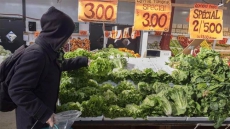OTTAWA — High-ranking Belgian officials played down a perceived snub of the Belgian king and queen by Prime Minister Justin Trudeau as the royal couple carried on day two of their week-long state visit to Canada.
A meeting between Trudeau and the royal couple would have been preferred, Belgium's deputy prime minister said in an interview Tuesday.
"It's all the time better to have contact with the prime minister," Didier Reynders said.
But Reynders, who is also Belgium's foreign and European affairs minister, said he understood that Trudeau is dealing with more pressing political concerns: namely, showing support for his country's steel and aluminum industries.
Trudeau launched a cross-country tour of steel and aluminum mills this week in light of potential tariffs on the metals being imposed by the U.S. government, even though Canada and Mexico were granted a temporary exemption from the tariffs last week by President Donald Trump.
"It's a choice," Reynders said of Trudeau's decision to immerse himself in meetings with steel and aluminum producers.
"We have full respect for such a choice."
A government source, who was not authorized to speak publicly and requested anonymity, said Belgian officials were told well in advance of the planned visit by King Philippe and Queen Mathilde that Trudeau would likely be unavailable to meet with them this week.
But that message was relayed before the prime minister planned his outreach tour of cities that could be impacted by tariffs.
What was more important for Belgium this week, said Reynders, was that Canada's International Trade Minister Francois-Philippe Champagne was available to discuss trade issues with Belgian political and industrial leaders.
"Of course we'd prefer also to discuss with the prime minister," said Reynders.
"As a politician, I fully understand that this may be a priority to be very close to the workers and very close to the different people in the steel industry and in aluminum than to organize a contact during a state visit."
Several other federal cabinet ministers have greeted the royals so far; among them Treasury Board President Scott Brison and Veterans Affairs Minister Seamus O'Regan, who was at Gov. Gen. Julie Payette's side as she officially welcomed the couple Monday at Rideau Hall.
King Philippe spoke Tuesday at the University of Ottawa where he also met with students and academics before attending a First World War commemoration, where a cannon from the war that was gifted to Belgium in 1919 was put on display at the Canadian War Museum.
Trudeau, meanwhile, was in Hamilton, Ont., visiting the city's two largest steel producers in a show of solidarity with workers as the Liberal government also worked back channels to ensure that Trump's threat of tariffs doesn't become a reality.
Trump has tied Canada's exemption from the tariffs to a successful and speedy conclusion to negotiations to modernize the North American Free Trade Agreement.
On Monday, Trudeau visited aluminum facilities in Quebec, but also spoke with President Trump by telephone about the NAFTA talks and the potential threat to impose tariffs.
The White House said Trump emphasized on that call "the importance of quickly concluding the ongoing NAFTA negotiation" while Trudeau said he warned that slapping tariffs on Canadian steel and aluminum would only serve to harm the NAFTA talks and would run counter to Trumps stated goals of saving American jobs and lifting the U.S. economy.
Reynders said the unfolding tariff spat, which still threatens European industries, is a reminder of the importance of diversifying relations with countries, including Canada, where governments are more open to co-operative trade.
He cited the Comprehensive Economic and Trade Agreement, known as CETA, between Canada and the European Union, as a clear example of how countries and regions can mutually benefit from opening their doors to freer market access.
Belgium is among the roughly 20 countries that have yet to ratify CETA, but that process could be completed by as early as the end of this year, Reynders predicted.
It wasn't too long ago that Canada was paying much attention to Belgium as it worked to overcome resistance to CETA by the European country's Wallonia region, which held out the threat of vetoing the pact before it was eventually signed in October 2016.
The Walloons were backed at the time by anti-trade activists in opposing CETA's investor-state dispute settlement mechanism.
But a change of government in Wallonia last year was expected to nullify any further resistance to ratification, Reynders suggested.
"It's (no longer) a problem to implement and ratify the entire document," he said, save for a European court ruling expected soon on investor provisions of the agreement.






